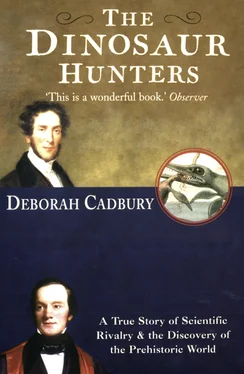However, his letter was regarded as of such insignificance by senior members of the Society that it was not even read out, as planned, to the eminent company. For one thing, George Bellas Greenough, a Fellow of the Royal Society, a former MP and the first Chairman and President of the Geological Society, was convinced that iron-sand was always a marine deposit. Since Mantell had reported some freshwater shells mixed in with the giant bones, Greenough insisted that the Tilgate beds could not be iron-sand and refused to change his opinion in the light of Mantell’s findings.
William Buckland, too, was certain that the Weald rock resembled a recent, Tertiary rock he had seen while travelling in Italy and so was not a Secondary stratum. Consequently, in his view, Mantell’s ‘reptiles’ had to be large mammals. And such was the standing of both Buckland and Greenough that other members could not accept that a provincial surgeon could possibly have knowledge that surpassed that of the Oxford and London men who were the leaders in the field.
Over six months elapsed before it was decided that Mantell’s letter to Fitton on the strata of the Tilgate Forest would be read before the Geological Society. The minutes of the meeting on 17 January 1823 show that both Lyell and Mantell were present. At the Council committee meeting the following week, Mantell’s paper was read and passed on to referees to check before publication. However, it remained unpublished for a further three years. The archives reveal that Gideon Mantell had considerable difficulty getting his papers published by the Society. One unsigned letter from a referee considering his paper on fossil vegetables wrote: ‘the notice is not of sufficient importance to be printed’. George Greenough, too, turned down Mantell’s paper on the Tilgate Forest. William Buckland was so convinced that Mantell was wrong, he wrote specifically to warn him against claiming that the teeth and bones were found in ‘the older Iron-sand formation’. Mantell believed this advice came from the best of intentions and commented on ‘the generous kindness that marked his character’.
Mantell’s uphill struggle to get his ideas accepted by the experts was not unique. One amateur geologist, Robert Bakewell, who was not allowed to join the Geological Society although he wrote a popular book, Introduction to Geology, wrote frankly about the difficulties. ‘There is a certain prejudice,’ he said, ‘among the members of the Scientific Societies in London and Paris, which makes them unwilling to believe that persons residing in provincial towns or the country can do anything important for science.’ William Smith, the surveyor who pioneered studies of strata in England and was also not a member, once remarked: ‘the theory of geology was in possession of one class of men [at the Geological Society] and the practice in another’. Gideon Mantell, an amateur from the provinces with none of the trappings of the upper classes, was very much an outsider. The disappointment he felt at the rejection of his ideas, and his failure to obtain recognition for his giant lizards, was recorded in his diary:
Конец ознакомительного фрагмента.
Текст предоставлен ООО «ЛитРес».
Прочитайте эту книгу целиком, купив полную легальную версию на ЛитРес.
Безопасно оплатить книгу можно банковской картой Visa, MasterCard, Maestro, со счета мобильного телефона, с платежного терминала, в салоне МТС или Связной, через PayPal, WebMoney, Яндекс.Деньги, QIWI Кошелек, бонусными картами или другим удобным Вам способом.












